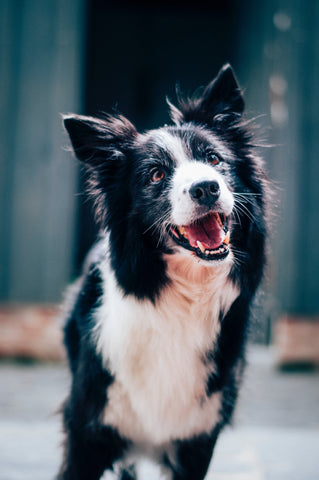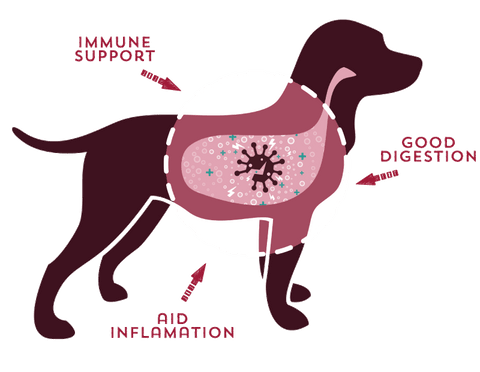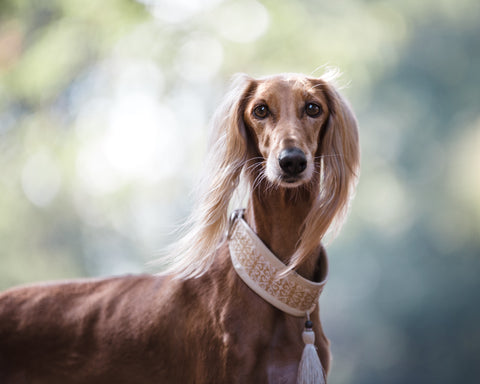Animal Wellness

It's no secret, your dog is not the most concerned with eating only the most nutritious of food available - he's just hungry and completely trusting of your ability to fill him with exactly what he needs.
Knowing exactly what your dog needs can be a daunting challenge, as new discoveries and insights are made every day, bringing your dog closer to a place of optimal health and further away from the heart-wrenching afflictions that seem to needlessly cut our loved ones' lives short.
While there is no cure-all for health problems in older dogs or quick-fix after adopting a puppy, you can put your dog in the best position possible by understanding how his body works and being caught up on the latest knowledge on animal wellness - a wellspring growing deeper by the day.
Gut and Immune System Wellness

Your dog's gut is a wonderland of interconnected systems that, if all is going well, can properly deal with most things that stand in its way.
Unfortunately, we do not live in a perfect world and, more often than we would like to admit, your dog gets into food (or something he thinks is food) he should not be eating or nosing into a dirty nook in the house.
A canine's GI tract is about as sophisticated as they come, it is also extremely sensitive to the introduction of new foods and the sacred micro-flora balance. Much of the reason dog's tummies are so sensitive is due to their inherent eagerness to chomp on just about everything bite-sized - digestible or not.
When your dog takes a bite out of the long-forgotten dust bunny under the couch or the bit of cheese that found its way under the bed a disturbingly long time ago, he is introducing all kinds of bad bacteria into a delicate equilibrium of intestinal bacteria.
These reinforcements of bad bacteria can spell trouble for his gut and make your life more stressful.
Signs of A Gut In Trouble
While you likely do not own a pair of x-ray goggles to see the state of your dog's GI tract, there are signs to look for if Fido's gut is out of whack.
- Excessive flatulence
- Loose stool, diarrhea
- Vomiting
- Eating Grass
Flatulence

There you and your pup are, lying awake in the middle of the night - trying to get some well deserved sleep. That is, until you yawn widely, and realize an airstream of sulpherous rotten eggs recently exited your dog's booty only to enter your mouth. Yuck.
While not the most pleasant experience for your mouth and nose, your gassy golden retriever is suffering the most - likely bloated and holding in a less than firm bowel movement.
Flatulence is a natural part of being alive for both you and your pup. However, not all farts are indicative of healthy digestion. If you feel your dog's gas blasts are on the upswing, his butt could be telling you the story of bad bugs lurking below.
Loose Stool / Diarrhea
When there's smoke, there's often fire, and when the smelly winds are blowing from the backside of your canine, a storm of liquid could very well be brewing.
A dog with diarrhea is often a dehydrated and straining mess, simply trying to rid himself of whatever is causing so much discomfort. It's no fun for you either, taking your little guy out to use the bathroom upwards of twenty times a day or dealing with the fact that your rugs are browner than you remember them being.
Loose stool is almost always an indication that something isn't quite right. While not typically life-threatening, it can be an indication of something more severe going on. If your dog has diarrhea for more than 48 hours, contact your veterinarian and schedule an appointment.
Eating Grass / Vomiting
Have you ever wondered: "Why do dogs eat grass?"
If so, you're not alone.
Many a pet owner has lamented that their fur-ball spends more time nibbling on the crab grass than anything else. While dogs eat grass for various reasons, there may be an uptick in grass-gorging when the GI tract isn't quite right.
Dogs eat grass during these times of discomfort to help soothe the stomach. Often times the blades will rub against the stomach and lead to an unannounced up-chuck.
You should not be overly alarmed if he vomits a mess of mostly grass, but do take the moment to realize that his tummy isn't feeling so hot.
If your dog has both diarrhea and is vomiting much of the food he is ingesting, it is time to take him to the vet immediately. He likely has some kind of bug, bacterial infection, or GI problem.
Animal Wellness Solution : The GI Tract
So your dog has some combination of the symptoms listed above, is there anything you can do from home to help support your buddy? Absolutely.
Human grade probiotic powder for dogs is something that is taking the pet world by storm. Probiotics are essentially good bacteria that are ingested to recolonize the upset intestinal tract and bring balance back to Fido's life. Giving him a daily probiotic will help maintain healthy digestion and will help keep your dog a little more regular and that carpet a little cleaner.
Coat and Skin Wellness

Your dog's skin is his largest organ and the most open to damage from above and below. Because of this, it is often the first thing you will notice if Fido contracts something damaging.
This is both a gift and a curse.
While the quick dandruffy heads up is appreciated and can be life-saving, itchy skin and balding spots are uncomfortable and can cause unnecessary suffering. An unhealthy coat is just no fun for a tail-wagger accustomed to having the silkiest coat in the dog park.
Your sweet pup doesn't have to completely lose the shining luster that brought all the dogs to the yard, there are things you can do to keep his fur shimmering and his skin smooth like a puppy's tummy!
Coconut Oil
If you answered yes, you would be right! Coconut oil is one of the best things you can give your buddy. Coconut oil is a mostly saturated fat that contains lauric acid, a compound that nourishes the skin and coat, and acts as fuel for the brain.
Coconut oil can be applied topically and can be ingested. Fidobiotics recommends finding a vet-approved coconut-oil dog shampoo (or you can just make your own) and giving your dog a warm bath at least once a week. Doing so will keep him shining more and itching less.
Beyond shampoo, coconut oil can be found in human grade probiotics for dogs. The combination of the two may just be everything your itchy Alfie has been looking for.
Proper Diet
Giving your dog the right kind of nutrition is key to keep his body running as nature intended. Canines are omnivorous and should be eating a diet full of high-quality meats and certain vegetables.
There are many foods that are dangerous for dogs to eat, but a surprising list of foods that are massively beneficial for their health.
It is important for every pet owner to have an intimate knowledge of what your dog's food contains. While certain healthy grains should be embraced, fillers such as corn should be avoided. Make it your mission for Fido's dog food to contain a high-quality meat as the first or second ingredient. If you're able to, look into giving your dog a raw-diet - his tummy will thank you for it!
Explore Dog Ingredients
Are Mushrooms Safe For Your Dogs?
Mental Wellness

When thinking about animal wellness, the mental aspect should not be understated. Your goof-ball is a mostly happy and chilled out kind of guy - but that doesn't mean he's a zen dog all the time.
Your dog's mental wellness has a great deal to do with the food that you're giving him, the state of his gastrointestinal tract, environmental factors, the past, and genetics. While you do not have control of his genetics or past experiences, you certainly can affect his GI tract through his diet and supplementation.
Giving Fido a dog calming aid is a simple and effective way to maintain a healthy mental state. Be sure to look for all natural solutions, ones that include probiotics, and calming ingredients as ginger, valerian root, chamomile, and L-tryptophan for dogs.
Beyond supplements, their are other techniques to keep him calm. Learn more about how to calm down a dog.
